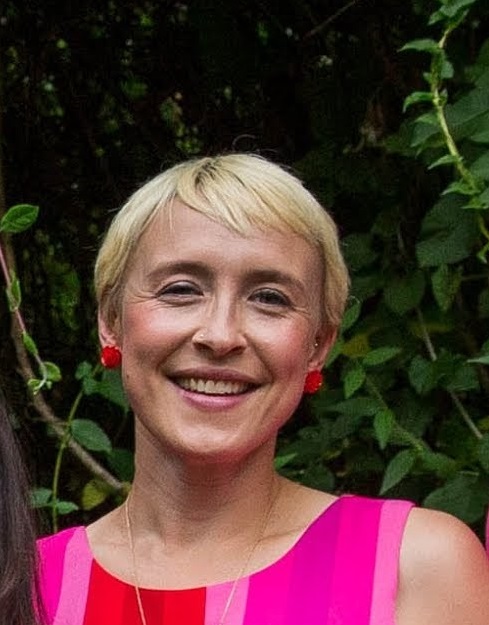
Last month we said goodbye to Encompass Trustee, Madeleine Mosse. Madeleine has been an integral part of the Encompass family for many years, working, consulting and finally becoming a very valuable Trustee. Thank you Madeleine and good luck with your next steps!
Taking Madeleine’s place as Encompass Trustee is Erika Moisl, welcome back Erika! Erika joined Encompass in 2008 as a Programme Manager, working in this role for three years. We caught up with Erika to find out what she’s been up to since leaving Encompass and what she hopes to bring to the table as new Encompass Trustee:
Can you tell us a bit about your experience working in the charity sector?
“I’ve worked in the charity sector for around 15 years and I joined Encompass Trust in 2008 as a Programme Manager. I was in this role for about three years which was a great experience. As the organisation is really small, it was like a family. My colleagues were great and I’m still friends with a lot of them.
Before joining Encompass, I completed a Master’s in human rights. I’ve since worked for a number of other charities including NSPCC, The Resource Alliance and Alzheimer’s Society. I started off working as a Programme Manager and then moved into the evaluation side of things. This requires thinking about the purpose of an organisation, looking at whether they’re having their intended effect or not, and thinking about what can we do to improve the way that their programmes work. This process involves gathering and analysing evidence to recommend how programmes may be made more effective.
I now work at Crisis, an organisation that tackles homelessness. Again, I’m working in evaluation, trying to get people to think about what they’re trying to achieve through their programmes. We do a lot of data analysis and talk directly to service users and other kinds of stakeholders, as well as staff and volunteers and other partner organisations that we work with to try and understand not only what the organisation’s doing, but how this contributes towards the organisation’s goal of ending homelessness. With the coronavirus pandemic, it’s been a particularly challenging time.”
What did you learn during your time at Encompass?
“Despite helping to organise Encompass’ Journey of Understanding (JoU) programme, I think being a witness to participant’s discussions makes you feel like you’re sharing their experience. I don’t spend a lot of time in my daily life thinking about things like my identity, so I found it quite challenging to actually do the tasks we were asking of participants.
We did sessions where JoU participants would have to talk about their preconceived notions of each other.I learnt a lot about people’s preconceptions of ‘the other’, particularly across the Israeli Palestinian divide. I hadn’t realised these negative perceptions were so ingrained at such a young age. Despite there often being a feeling of hatred towards ‘the other’ at the beginning of the programme, you’d start seeing participants communicate about everyday things. Through this they would start to see their commonalities. This was really inspiring to see.”
Do you have a favourite memory from your time at Encompass?
“I’ve got loads of favourite memories. A lot of them are working together with the facilitators. We would spend a lot of time reflecting on the programme and the discussions that arose during the programme. These reflections would go on well into the night. I also have some great memories of climbing mountains in the freezing cold snow. A lot of the Indonesian participants had never seen snow before so it was great. I remember talking to a boy from Bali who said he’d never understood why western tourists never have any clothes on and just lie on the beach all day. After spending time in snowy Scotland, he said he started to understand why!
Why do you think dialogue programmes like the Journey of Understanding are important?
“I think, because participants take part in the programme during their formative years, it is a great opportunity for young people to open their minds and broaden their horizons. Participants haven’t become set in their ways yet and are still forming their opinions and thoughts.”
It’s often said that we’re living in an increasingly divided world. What role do you think organisations like Encompass can play in narrowing these divides?
“It just comes down to having an opportunity to actually have a conversation with other people, to question them, but not in a way that it’s going to be censored or misconstrued. People are increasingly talking over social media and statements are often read in a way that they weren’t intended to be read. This leads to people overreacting and a breakdown in dialogue. In programmes like JoU, you have sustained involvement with someone. You can ask them questions directly and if someone reacts in a particular way you can have a discussion and learn from that other person’s experience.”
What do you hope to bring to Encompass as a new Trustee?
“I hope, having worked in the evaluation field for a number of years, I can support developing evidence around the effectiveness of Encompass’ programmes, thinking about what the organisation really wants to achieve and looking at if we’re doing it in the most effective way. If there is evidence demonstrating the positive effect they’re having, working on communicating this to supporters, funders and other organisations and working in partnership with them as well.”

Comments are closed